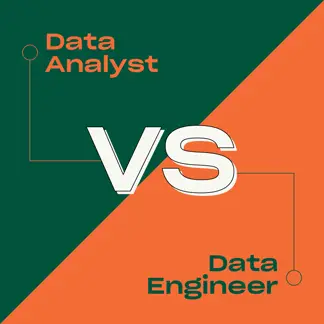Data Engineer Jobs
1. What is Data Engineering?
Data Engineering is the process of creating and developing systems for mass data collection, storage, and analysis. It is a wide field that has applications in nearly every sector of the economy. Enterprises can gather vast quantities of data, and to guarantee that this data is extremely valuable for data scientists and analysts, they require the appropriate personnel and technology.
The procedure of gathering and storing data is the first step in the standard data science workflow that data engineers handle. They make sure that other data science experts, like data scientists and analysts, may easily access the vast amount of data gathered from various sources.
Working as a data engineer makes life simpler for data scientists and offers real impact in a world where by 2025 we will be creating 463 exabytes each day. That is one and eighteen zeros of information.

2. What are the differences between Data Analysis and Data Engineer?
Since data science has grown so rapidly in recent years, the roles of data engineer and data analyst have become increasingly important in the data science ecosystem. Data engineers and data analysts are paid differently even though their titles are commonly used interchangeably. This is because the two roles are distinct and require different skill sets. Large data sets must be analyzed for a data analyst to conclude. To find patterns, trends, and insights, they employ computer languages and statistical analytic tools. A data engineer, on the other hand, is in charge of creating, building, and managing the architecture and systems required for data analysis.
The emphasis areas and skill sets of a data engineer and an analyst differ from one another. Whereas a data engineer concentrates on data infrastructure, a data analyst concentrates on data analysis. Because data engineers and analysts have diverse tasks and skill sets, their salaries also differ. If someone is thinking about moving from data analysis to data engineering, further education and training could be required to have the skills needed for the position. However, because of their unique skill set and duties, data science engineers and analytics engineers may earn greater salaries.

3. What does a Data Engineer do?
Data engineers create systems that gather, organize, and transform unprocessed data into information that can be interpreted by data scientists and business analysts in a range of contexts. Making data available is their ultimate objective so that businesses may utilize it to assess and improve their performance.
When dealing with data, a data engineer may frequently complete the following tasks:
-
Obtain datasets in line with business requirements.
-
Create algorithms to convert data into information that can be used and acted upon.
-
Construct, evaluate, and manage database pipeline designs.
-
Work together with management to comprehend corporate goals.
-
Develop fresh approaches to data validation and tools for data analysis.
-
Verify adherence to security and data governance guidelines.
Taking on a wider range of data-related responsibilities in a generalist job is common while working for smaller businesses. While some data engineers at larger firms specialize in establishing data pipelines, others manage data warehouses, generating table schemas to monitor data storage locations and adding data to the warehouses.
To sum up, data engineers have the most technical roles in data science, and they play an essential part in bridging the gap between conventional data science occupations and software and application developers.
4. What are the important skills for a Data Engineer?
Coding - Most data engineering jobs require coding, which is a highly sought-after ability. A fundamental familiarity with programming languages such as Python, Golang, Ruby, Perl, Scala, Java, SAS, R, MatLab, C, and C++ is highly desired by many businesses.
Data Warehouse - The enormous amount of data that has to be stored and analyzed falls within the purview of data engineers. For this reason, having knowledge of and expertise with data warehousing platforms like Redshift or Panoply is essential for a data engineering position. Those with expertise in managing and interpreting data from data warehouses may be able to find additional positions for which they are qualified due to the expanding use of these systems.
Data Systems - Data engineers need a strong grasp of information management systems and database administration. In-depth knowledge of SQL is particularly valuable, given its widespread use in the industry for managing and extracting table-based data. Familiarity with various database options like Bigtable or Cassandra is also essential, especially for those pursuing freelance data engineering.
Data Analysis - Employers typically seek data engineers with expertise in analytics software, including Apache Hadoop-based solutions like MapReduce, Hive, Pig, and HBase. Data engineers primarily focus on constructing systems to collect data for use by analysts or scientists. Strong analysis skills are advantageous for engineers to develop and enhance these systems effectively.
Critical thinking - To assess problems and devise innovative solutions, particularly when developing new solutions. This skill is crucial for designing and troubleshooting data collection and management systems effectively.
Understanding of machine learning - Gaining an understanding of data modeling and statistical analysis makes them more valuable assets to firms and improves their capacity to provide workable solutions. Furthermore, as machine learning gains traction in a variety of sectors, data engineers may pursue a wide range of job options with this expertise.
Communication skills - Clear communication, whether sharing insights with data experts or presenting findings to non-technical peers, is crucial. Proficiency in digital communication formats is also essential, given the increasing prevalence of remote work.














